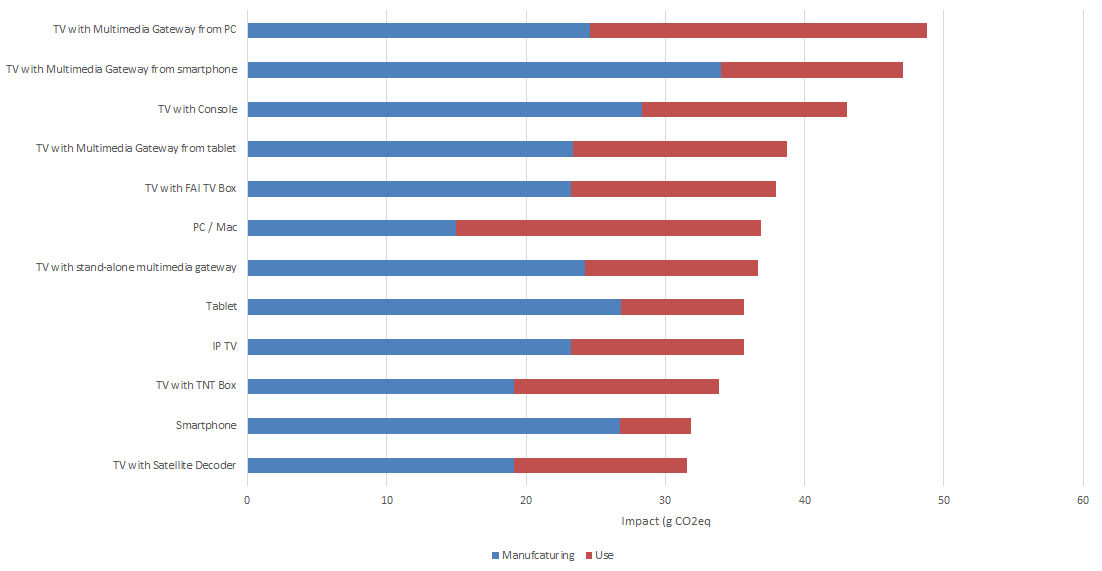Research, screen.is
Case studies
UK - BBC comparison of media
The BBC compared streaming against broadcast, satellite and cable:
- iPlayer at 0.19 kWh/device-hour [98 gCO2e/device-hour],
- satellite at 0.16 kWh/device-hour [82 gCO2e/device-hour],
- cable at 0.15 kWh/device-hour [78 gCO2e/device-hour],
- terrestrial at 0.06 kWh/device-hour [31 gCO2e/device-hour].
France - detailed anatomy of one Canal+ Video
Researched by GreenSpector, did a case study comparing the impact of playing a Canal + video depending on its bandwidth, and the device streamed to, with a range from SD on a smartphone, to TV on UHD – and a difference in impact of 80x. They recognised the following variables:
Visualization - looking at SD, HD and UHD
Device energy consumption - smartphone, tablet, laptop, PC, TV-cable, TV satellite, TV ethernet
Network costs, varying between fixed wire and GSM mobile:
- 13 Wh / Go for the core network (source CONVINcE)
- 30 to 40 Wh / Go for the fixed network
- 150 Wh / Go for the GSM network (source CONVINcE)
CDN costs - they found examples from 0.04wh to 1wh and settled on 0.14 Wh / h.
Encoding/decoding,
- For IPTV: 0.09 Wh for one hour of video
- For the OTT: 0.30 Wh for one hour of video They settled on "across the Canal+ fleet, the average end-to-end consumption is 214 Wh per hour of video". France has a very clean grid as it's almost entirely nuclear powered, so the impact ranges from 20 to 66 g CO2 eq (IEA estimate for france was 8g - under 25% of their global 36g figure. Interestingly, the variance wasn't so great between output type once everything was added together:

In this same study, the estimate of the purchase of a DVD is 400g EqCO2, which therefore leads to the impact of watching a 2-hour video. 5 times less than that of buying a DVD in France and equivalent in the US.
Global - music video worked example
Mostly tho the data is missing so estimates must make guesses. An estimate was made for the 7 billion online views of the music video Despacito https://www.linkedin.com/pulse/despacito-streaming-energy-consumption-rabih-bashroush/ and came to 908.93 GWh (energy, not hardware).
However, Gauthier Roussilhe says:
I've reviewed the Linkedin article about Despacito. The calculation seems way off because he used a high-end estimate of energy use for data transmission. According to Coroama the consensus for networks will be around 0,01 kWh/hour up to 0,06 kWh in 2015. The author is using a massive 1,6 kWh/hour."
"I wrote a library to generate random data called Faker. As of today, it's been installed 116 Million times and probably executed a hundred times more. If each execution of Faker emits a milligram of CO2, I'm now responsible for 11,6 Metric tons of CO2 emissions. Had I designed Faker to be just a bit more energy efficient in the first place, the effects would already be huge today." François Zaninotto ref
If the Internet were a country, it would be the sixth largest in terms of electricity use. ICT doesn’t just produce between 2.1% and 3.9% of global greenhouse gas (GHG) emissions – more than aviation or shipping – but as more of the world get online at faster speeds, watching more video for longer, this share is rising fast.